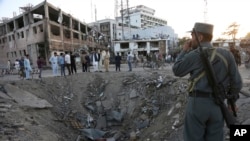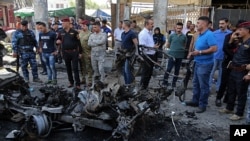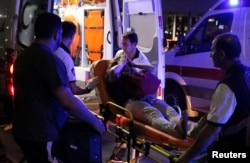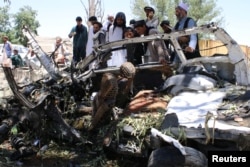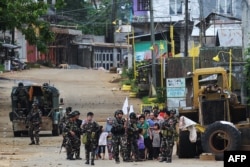More than 90 dead in a suicide bombing in Kabul. A pair of attacks in Baghdad that killed 27. An ongoing battle in the southern Philippines against Islamic State.
The Muslim holy month of Ramadan is only a few days old. But what is supposed to be a time of self-sacrifice, prayer and piety is again being marred by violence and conflict.
No one group is responsible, analysts say, and there rarely appears to be links to the varied mayhem. With wars in Syria, Iraq and Afghanistan – and terror attacks seemingly growing more frequent in Europe, Asia and the Middle East – it has become unrealistic to expect conflict to cease during Ramadan, they say.
As in past Ramadans, IS has encouraged its followers to step up attacks during the holy season when observant Muslims fast during the day and religious acts are believed to bring a higher reward than the rest of the year.
“Your targeting of the so-called innocents and civilians is beloved by us and the most effective, so go forth and may you get a great reward or martyrdom in Ramadan,” said a message, titled “Where Are the Lions of War?” that the group recently issued on its social media site. “Attack them in their homes, their markets, their roads and their forums.”
Yasar Colak, religious affairs representative at the Turkish Embassy in Washington, said the message of violence runs directly contrary to the Quran.
“Islam does not allow violence at any time of the year. Violence can’t be and is not a legitimate way in Islam,” Colak said. “Terrorist organizations like IS are misusing and misinterpreting our religion and Sunna for their own political aims.”
But groups like IS and Taliban cite jihad – holy war – as justification for their actions.
“These extremists see their terror as an act of jihad,” said Seyyed Javad Taghavirod, a Tehran-based extremism analyst. “So the occurrence of some holy occasions, including the month of Ramadan, makes them feel more blessed to conduct their operations.”
Attacks during Ramadan are particularly effective because they cause psychological damage on people who are marking the occasion by going out with family and friends, and who are likely more off guard than usual, analysts say.
“Of course, their notion of war is theologically unjust, but most IS members are ignorant thugs and not legitimate religious scholars,” said Michael Rubin, a former Pentagon official and an analyst with the American Enterprise Institute in Washington.
Ramadan in 2016 saw waves of deadly terror that included a nightclub attack in Orlando killing 49 people, an IS suicide bombing on a Christian village in northeast Lebanon, an attack on the Istanbul airport that killed 40 people, violence at a café in Bangladesh, leaving at least 20 dead, and a truck bomb explosion in Baghdad that killed almost 300 people. As Ramadan was ending last July, Saudi Arabia was hit by four suicide attacks.
“The reason why they launch attacks during Ramadan is simply because they know they can murder lots of people easily,” Rubin said. “After a day of fasting, security forces might be distracted or absent.”
Shortly after Ramadan began on Saturday, a Taliban suicide car bomber struck a convoy of an Afghan elite force providing security to American forces in the eastern city of Khost, killing at least 18 personnel and wounding many others.
Since then, the death toll stood at 227 in 24 attacks as of Tuesday, according to a website run by a group called “The Religion of Peace” that monitors violence during the holy month.
In the Philippines, officials say violence began several days before Ramadan when a military raid to capture the man designated by IS as its leader in the country led allies and followers to advance a planned attack.
“They wanted to show the world that there is an IS branch here which can inflict the kind of violence that has been seen in Syria and Iraq," Philippine military Chief of Staff Gen. Eduardo Ano told The Associated Press.
Afghanistan’s National Directorate of Security said Wednesday’s suicide bombing in the tightly guarded diplomatic sector of Kabul was planned in Pakistan by the Haqqani Network, which has been closely affiliated with the Taliban. The Taliban said it had no ties to the bombing.
And while the Taliban did not directly call for an increase in terror attacks during Ramadan, it also said it would not ease up, rejecting as “ignorance of religion” U.N.-led calls for halting hostilities for the month.
“Our fight is jihad and an obligatory worship. And every obligatory act of worship has 70 times more reward in Ramadan,” a statement quoted spokesman Zabihullah Mujahid as saying.
(VOA Extremism Watch Desk reporters Kasim Cindemir, Ahed Al Hendi, Rikar Hussein and Mehdi Jedinia contributed to this story.)





